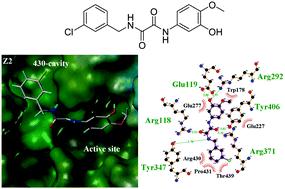当前位置:
X-MOL 学术
›
New J. Chem.
›
论文详情
Our official English website, www.x-mol.net, welcomes your feedback! (Note: you will need to create a separate account there.)
Design, synthesis and biological evaluation of oxalamide derivatives as potent neuraminidase inhibitors
New Journal of Chemistry ( IF 2.7 ) Pub Date : 2022-06-15 , DOI: 10.1039/d2nj00726f Xing Yong Zhang 1 , Li Ping Cheng 1 , Zhi Jian Zhong 1 , Wan Pang 1 , Xue Song 1
New Journal of Chemistry ( IF 2.7 ) Pub Date : 2022-06-15 , DOI: 10.1039/d2nj00726f Xing Yong Zhang 1 , Li Ping Cheng 1 , Zhi Jian Zhong 1 , Wan Pang 1 , Xue Song 1
Affiliation

|
Neuraminidase (NA) is an effective target for research and development of anti-influenza drugs. Herein, based on structure-based virtual screening, it was found that ZINC05250774, an oxalamide derivative, was a lead NA inhibitor. In this paper, a series of novel inhibitors (Z1–Z10) were designed and synthesized through modification and transformation of ZINC05250774. From the inhibition results, compound Z2 had the best inhibitory activity against NA (IC50 = 0.09 μM), which was better than that of the positive control oseltamivir carboxylate (OSC) (IC50 = 0.10 μM) and lead ZINC05250774 (IC50 = 1.91 μM). Molecular docking results indicate that the good potency of Z2 may be attributed to the 3-chloro-substituted phenyl, which can be extended into the 430-cavity by the oxalamide chain. Furthermore, the oxalamide group is also important for this series of compounds, which can form strong hydrogen bond interactions with the three essential positively charged arginine residues (Arg118, Arg292, and Arg371) at the active site. The results of this work may contribute to developing more potent NA inhibitors to fight the influenza virus.
中文翻译:

草酰胺衍生物作为强效神经氨酸酶抑制剂的设计、合成和生物学评价
神经氨酸酶(NA)是抗流感药物研发的有效靶点。在此,基于基于结构的虚拟筛选,发现草酰胺衍生物ZINC05250774是一种先导 NA 抑制剂。本文通过对ZINC05250774的修饰和转化,设计合成了一系列新型抑制剂( Z1-Z10 ) 。从抑制结果来看,化合物Z2对NA的抑制活性最好(IC 50 = 0.09 μM),优于阳性对照羧酸奥司他韦(OSC)(IC 50 = 0.10 μM)和铅ZINC05250774(IC 50 )= 1.91 微米)。分子对接结果表明Z2的良好效力可能归因于3-氯取代的苯基,其可以通过草酰胺链延伸到430-腔中。此外,草酰胺基团对于这一系列化合物也很重要,它可以在活性位点与三个必需的带正电荷的精氨酸残基(Arg118、Arg292 和 Arg371)形成强氢键相互作用。这项工作的结果可能有助于开发更有效的 NA 抑制剂来对抗流感病毒。
更新日期:2022-06-15
中文翻译:

草酰胺衍生物作为强效神经氨酸酶抑制剂的设计、合成和生物学评价
神经氨酸酶(NA)是抗流感药物研发的有效靶点。在此,基于基于结构的虚拟筛选,发现草酰胺衍生物ZINC05250774是一种先导 NA 抑制剂。本文通过对ZINC05250774的修饰和转化,设计合成了一系列新型抑制剂( Z1-Z10 ) 。从抑制结果来看,化合物Z2对NA的抑制活性最好(IC 50 = 0.09 μM),优于阳性对照羧酸奥司他韦(OSC)(IC 50 = 0.10 μM)和铅ZINC05250774(IC 50 )= 1.91 微米)。分子对接结果表明Z2的良好效力可能归因于3-氯取代的苯基,其可以通过草酰胺链延伸到430-腔中。此外,草酰胺基团对于这一系列化合物也很重要,它可以在活性位点与三个必需的带正电荷的精氨酸残基(Arg118、Arg292 和 Arg371)形成强氢键相互作用。这项工作的结果可能有助于开发更有效的 NA 抑制剂来对抗流感病毒。






































 京公网安备 11010802027423号
京公网安备 11010802027423号